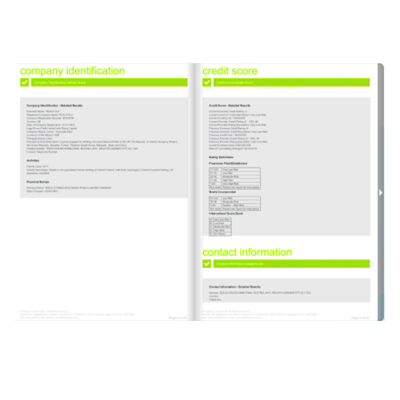Customer due diligence in AML compliance: What it means and best practices
Anti-money laundering is one of the biggest threats to the financial services and regulated sectors, with the National Crime Agency …
Carrying out a credit check on a business is vital for good financial planning. It allows you to deduce whether the prospect or future supplier or partner is financially sound, trustworthy, and reliable.
Without valuable information into payment behaviour and past and projected financial stability, you open your business up to the risk of potentially severe economic damage. We encourage our clients to mitigate risk where possible to safeguard cashflow and protect supply chains.
Tough economic conditions provide the perfect breeding ground for business fraud. Scammers usually target SME’s due to limited resources and their need to focus on economic survival and growth rather than due diligence.
Without knowing who your customers and suppliers are, you leave your business vulnerable to fraud. That is why we encourage our clients to follow a risk-based approach and carry out due diligence on all prospects, suppliers, and partners in order to mitigate the risk of exposing your company to fraud and financial hardship.
Checking the legitimacy of any business relationship is important for the reputational and financial survival for any enterprise. If your business is classed as a regulated entity under money laundering regulations, you can also use company reports to fulfil your legal due diligence obligations. Under money laundering regulations regulated entities are required to take measures to verify businesses and identify any beneficial owners.
Keeping tabs on the state of play within your industry is integral for business success. Company reports can be used to gain quick insights into your competitors, partners, and targets – giving your business a competitive edge.

A business credit check will usually verify company information such as the registered company name, company registration number, company status, employee information, company history, latest turnover, and other contact details such as registered addresses.
A business credit score is a number given to a company by credit reference agencies. It acts as an indication of how creditworthy it is to other businesses, suppliers, and partners.
A credit limit is a suggestion of how much credit (at a maximum) should be extended at any one time to the company in question.
A business report will include details on a company’s active and past directors.
A business check will allow you to learn about every percentage owned of a business, view any subsidiaries and all linked businesses within a group structure of the company in question.
5 years of financials will be available to view via a business credit report. This includes Profit & loss, Balance sheet and Ratios.
A company report will highlight if the company you are viewing has any CCJs, charges and bankruptcies. A CCJ will show on a report for up to 6 years, unless paid off within a month.
Additional information such as a company’s payment behaviour with invoices in the past can be viewed within a business credit report.
Veriphy offers pay as you go UK and certain International company reports within its secure dashboard.
Once you receive your log in details, simply click on the company reports tab, type in the name of the desired company and click ‘purchase.’
It is that simple. Within seconds you will have a full company report at your disposal to make informed decisions to protect and grow your business.